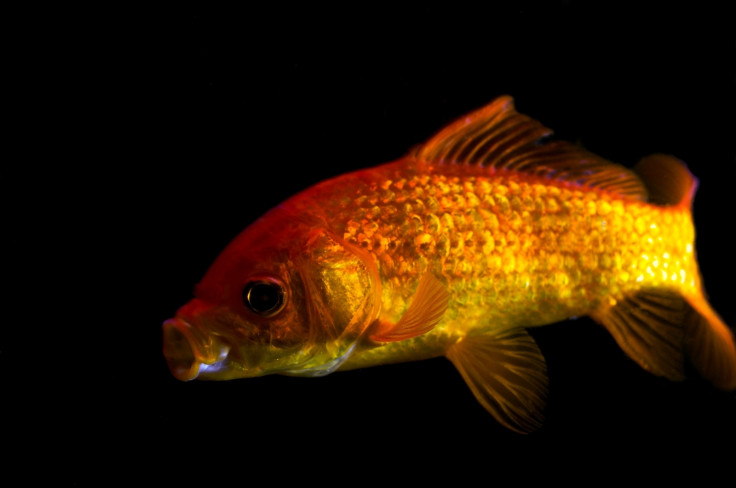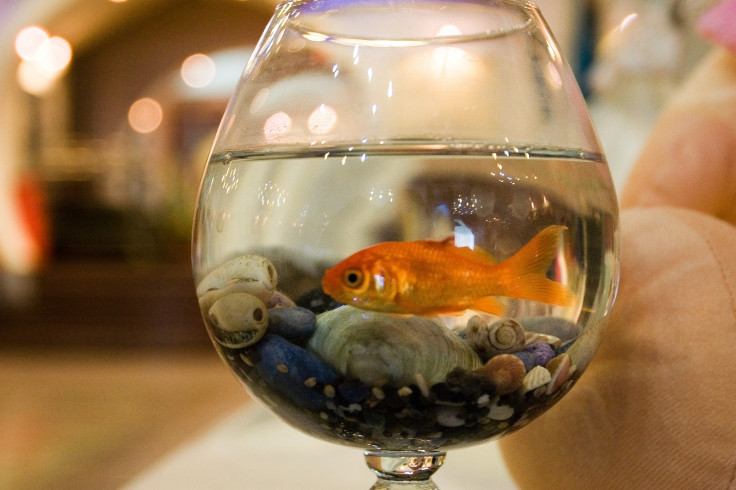Goldfish 'get drunk for three months' to survive winter
It's a good job fish don't need a license to swim – in winter they're permanently over the limit.

Alcohol might seem like an understandable way to survive long winters. But for goldfish, getting drunk is a matter of life and death. The fish at the bottom of icy ponds have no access to oxygen but manage to survive thanks to a unique metabolic pathway that floods their blood with alcohol.
By making ethanol, the fish can sustain anaerobic respiration, which uses no oxygen, for months at a stretch. Scientists have now discovered how goldfish and crucian carp have this ability, which is unique among vertebrates. Their findings are published in a study the journal Scientific Reports.
Humans are capable of anaerobic respiration too – a sprinter, for example, can run a whole race without breathing. Anaerobic respiration is much less efficient than aerobic respiration, which uses oxygen, and it creates the by-product lactic acid. This is what causes muscle pain after exercise. Too much lactic acid, or lactate, can essentially poison the blood.
So to get rid of lactic acid, fish have evolved a metabolic pathway in the powerhouses of the cell, the mitochondria, which gets switched on in the absence of oxygen. This pathway converts lactic acid to ethanol, which can then diffuse through their cells to their gills and then out into the water.
The fish have gained their unique ability through a rare evolutionary event where their genome was duplicated. Having an extra copy of their genome allowed them a little more freedom in their evolution. One copy of a given set of genes carried on doing its essential tasks, while the other set accumulated novel mutations. Among these were genetic changes that allowed the fish to make ethanol.
The ability to make ethanol in this way is extremely rare in nature. Only microorganisms such as yeasts, certain worms and mosquito larvae are known to do it, as well as some plant roots. And they make it in no small measures.
"It's a substantial amount of alcohol. It's like being drunk for three months and surviving," study author Michael Berenbrink of the University of Liverpool told IBTimes UK.
Scientists have tested how much alcohol the fish can make using what they term "fish hotels". If you put a fish in a pint glass, seal it off so no oxygen can enter and put it in a fridge (the 'hotel') for three months, at the end of it you'd have some delicious fishy alcohol about the strength of a standard pint.
Drunk like a fish
These fish would be over the legal blood alcohol limit for driving in many countries, including:
- Austria
- Croatia
- France
- Germany
- The Netherlands
- Ireland
- Portugal
- Spain
But the fish would be fine the UK, where the limit is 80 mg per 100 ml.
As well as being a fascinating insight into fish biology, the findings have some considerable implications for the study of alcohol toxicity in humans. Zebrafish – a relation of the goldfish – are often used in toxicity tests.
"They basically plunge a fish into different concentrations of ethanol and see how they behave," Berenbrink said.
The fact that fish are able to make their own alcohol gives them a higher tolerance than we have. At the end of their three-month bender, the fish are still perfectly capable of mating and producing healthy offspring.
"Perhaps in the future, we can learn something from these fish how they can actually tolerate such high levels of alcohol, and see what we can learn about it for treating human addiction.
"I don't want to encourage people to drink more alcohol, but these fish can certainly tell us something new about alcohol's toxic and non-toxic effects."

© Copyright IBTimes 2025. All rights reserved.






















